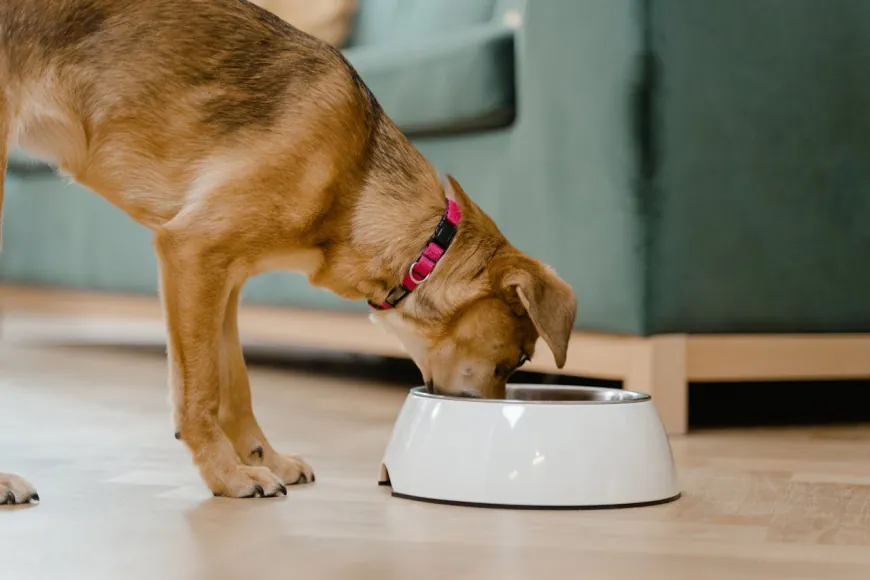How to Create a Balanced Diet for Your Dog
Ensure your dog's health with a balanced diet. Learn key nutrients, feeding tips, and meal planning for a healthier, happier dog.

It's critical for your dog's health and wellbeing to provide them with a balanced diet. The nutrients required to support growth, preserve good physical functioning, and avoid nutritional shortages are found in a well-balanced diet. In order to create the best possible diet for your dog, you must comprehend the basic elements of dog nutrition and know how to adjust them to meet your dog's individual requirements.
Understanding Dog Nutrition
Dogs need to eat the proper amounts of proteins, lipids, carbs, vitamins, and minerals in a balanced diet. Every one of these nutrients is essential for preserving health and making sure that every biological system operates as it should.
Proteins: Proteins are essential for immunological response, tissue repair, and growth. They consist of amino acids, some of which dogs cannot manufacture on their own, making them necessary. Sources of high-quality protein include fish, chicken, eggs, and meat. Dogs need protein to grow and maintain muscular mass; growing pups and energetic adult dogs especially need it.
Fats: Fats are a concentrated kind of energy that are necessary for the absorption of fat-soluble vitamins A, D, E, and K as well as for maintaining healthy skin and coat. Animal fats and plant oils like flaxseed and fish oil are good sources of fat. Additionally, fats contain important fatty acids that support general health and have anti-inflammatory qualities, such as omega-3 and omega-6.
Carbohydrates: Pawsbond suggest dietary fiber, carbohydrates help with digestion and give you energy. Dogs don't strictly need carbs, but they do benefit from them as a source of energy and to keep their digestive systems functioning well. Grain products like rice and oats, along with vegetables like sweet potatoes and peas, are good providers of carbs.
Vitamins and Minerals: Many biological processes, such as immune response, bone health, and cellular function, depend on vitamins and minerals. Vitamins A, B-complex, C, D, E, and K are all considered essential. Zinc, potassium, phosphorus, and calcium are among the important minerals. Although commercial dog diets usually contain these nutrients, you may need to supplement them if you're making a homemade diet for your dog to make sure they get the proper quantities.
Determining Your Dog’s Nutritional Needs
Dogs have different dietary demands depending on age, breed, size, exercise level, and overall health. Different needs apply to puppies, adult dogs, and senior dogs; furthermore, individual needs may differ even within these categories.
Puppies: Growing puppies need higher levels of protein and fat to support their rapid growth and development. They also require more frequent feedings than adult dogs, often being fed three to four times a day.
Choosing the Right Dog Food
Selecting high-quality dog food is key to ensuring that your pet receives a balanced diet. When evaluating commercial dog foods, consider the following:
Homemade Diets
If you want to make your own diets for your dogs, make sure they are well-balanced and satiate their nutritional demands. Diets produced at home can be flexible and let you use premium, fresh ingredients. But in order for them to be nutritionally adequate, meticulous preparation and supplementation are needed.
A pet nutritionist or veterinarian should be consulted before switching to a homemade diet. To make sure your dog gets all the nutrients they need, they can assist you in creating a feeding plan that is balanced and suggest suitable supplements.
Supplementing Your Dog’s Diet
In some cases, supplements may be necessary to address specific health concerns or nutritional gaps. Common supplements include:
· Omega-3 Fatty Acids: Found in fish oil, these can support skin health, reduce inflammation, and promote a healthy coat.
· Glucosamine and Chondroitin: These supplements support joint health and may be beneficial for dogs with arthritis or joint issues.
· Probiotics: Probiotics can aid in digestive health and support the immune system.
Always consult with your veterinarian before adding supplements to your dog’s diet, as they can help determine the appropriate type and dosage based on your dog’s individual needs.
Feeding Guidelines and Portion Control
Eating a healthy weight and avoiding obesity need careful portion control. Nutrient imbalances, obesity, and malnutrition are among the health problems that can arise from either overeating or underfeeding. Starting with the feeding recommendations found on the dog food container, modify the serving sizes according to your dog's weight, activity level, and overall health.
Regularly check on your dog's physical health and make necessary adjustments to their food consumption. In addition to helping you create a feeding schedule that is customized to your dog's individual requirements, your veterinarian can offer advice on reasonable portion amounts.

Monitoring Your Dog’s Health
It's critical to have your dog examined by a veterinarian on a regular basis to monitor their health and make any dietary adjustments that may be required. Your dog's weight, physical condition, and general health can all be evaluated by your veterinarian during these appointments, and if necessary, they can provide recommendations for food adjustments or extra supplements.
A dog's energy level, intestinal health, and coat condition can all be signs of their nutritional status, so pay attention to these. Consult your veterinarian about any worries you may have to make sure your dog's diet is still supporting their overall health and wellbeing.
Conclusion
For the general health and lifespan of your dog, you must provide a balanced diet. You can make sure that your pet gets the nutrients they need for a long and healthy life by learning about the components of dog nutrition, figuring out what your dog specifically requires, and choosing high-quality food or creating a balanced homemade diet. Maintaining the proper balance and taking care of any changes in your dog's health or nutritional requirements can be accomplished with regular monitoring, portion management, and discussions with your veterinarian. In addition to promoting your dog's physical well-being, a balanced diet also enhances their general quality of life.

 JodieJackson
JodieJackson 










